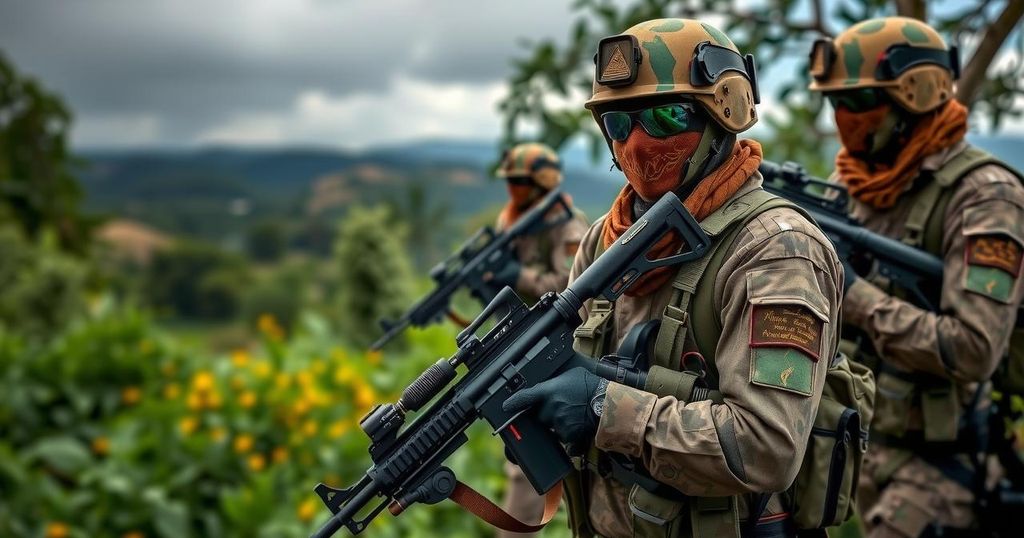M23’s Broader Agenda in Eastern DRC: Local Power Over Mining Control

The Rwandan-backed M23 rebel group is redefining conflict in eastern DR Congo by seeking local power through governance changes and control over trade, rather than merely focusing on mining operations. Historical land disputes and the undermining of local authorities illustrate a deeper agenda behind the violence, which has significant implications for regional stability and resource management.
The M23 Movement, a rebel group backed by Rwanda, has garnered significant power in the eastern Democratic Republic of Congo (DRC) since its resurgence in 2021. While prevailing narratives focus primarily on M23’s desire to control the region’s abundant mineral resources, a comprehensive analysis reveals a much broader strategy. The group is not merely motivated by the exploitation of mineral wealth; rather, it seeks to assert local dominance and redefine governance structures within the areas it occupies. M23 has effectively seized large territories in the North Kivu province, strategically surrounding the vital city of Goma. The group’s agenda involves undermining existing local authorities and establishing its own governance systems. This includes the appointment of M23 officials to replace customary leaders and the establishment of a taxing system to extract revenue from the local populace, which in turn allows M23 and its Rwandan supporters to financially benefit from the regional economy without directly managing the mines. Furthermore, conflicts surrounding land ownership are deeply rooted in the historical context of the DRC, tracing back to the colonial era when Rwandan migrants settled in North Kivu. The struggle for land access between Rwandophone communities and local groups has precipitated a cycle of violence, as armed factions are relied upon to resolve disputes over resources. Despite the perception of M23 as a protector of the Tutsi community’s claims to land, many Congolese Tutsi have not actively sought M23’s intervention, highlighting the complex dynamics and grievances that characterize this conflict. Moreover, M23’s control extends beyond taxation and military power; it has strategically positioned itself to regulate key trade routes, which benefits not only its operational goals but also meets the economic interests of Rwanda, particularly in halting Uganda’s transit ambitions toward DRC. This interplay complicates the overall landscape of regional conflict and resource management within the DRC. Ultimately, a sustainable resolution to the conflict will necessitate a thorough understanding and acknowledgement of the historical grievances and localized power struggles. Future peace initiatives must address the entrenched roles of militias in governance, land disputes, and inter-community relations to foster a lasting peace in North Kivu.
The Democratic Republic of Congo (DRC) is characterized by a long history of conflict, particularly in its eastern regions, due in large part to its vast mineral resources and complicated land ownership issues. The M23 Movement, emerging from long-standing ethnic tensions and historical grievances involving Rwandophone communities, seeks to capitalize on this tumultuous environment. The group has been often viewed through the lens of its quests for mineral control, but such a narrow interpretation overlooks the broader socio-political factors at play in the region. Historically, land access has triggered significant violence, prompting various armed groups to emerge, including M23, which now wields substantial influence in North Kivu by undermining local authorities and establishing new governance structures.
The resurgence of the M23 Movement in eastern DRC is multifaceted, rooted in historical conflicts over land, local authority, and economic control. Although the group’s activities impact mineral supply chains, its broader aim is the establishment of a new governance regime that reshapes local dynamics. For any hopes of achieving sustainable peace in North Kivu, it is imperative to engage in local dialogues that address historical grievances, dismantle militarized local governance, and repair inter-community relationships.
Original Source: www.defenceweb.co.za








